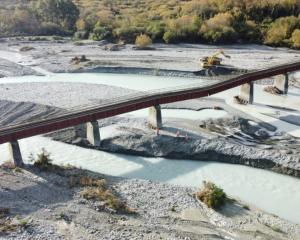A state of drought has been officially declared in Northland.
Primary Industries Minister Nathan Guy made the announcement at a Dargaville dairy farm this afternoon.
"This is recognition that we are now beyond what is a normal dry summer, and into an extreme climatic event. The entire North Island is extremely dry, but Northland is one of the worst-hit areas.
"The declaration of a medium-scale event means that extra Government funding will now be available to coordinate support through local organisations like the Rural Support Trusts. In extreme cases there will also be Rural Assistance Payments available to farmers in severe hardship."
Mr Guy said the decision came after receiving advice from the Ministry for Primary Industries, including soil moisture data from NIWA, and in consultation with the local community.
The drought announcement applies to the area north of the Auckland Harbour Bridge.
"We are closely watching other parts of the North Island which are extremely dry, in particular the Waikato and Hawkes Bay," Mr Guy said.
"Support is also available from Government agencies in all regions, even without a drought declaration. Farmers should contact IRD if they need help or flexibility with making tax payments, and standard assistance is available from the Ministry of Social Development.
"Farmers have been taking practical steps to deal with the dry, such as destocking and switching to once-a-day milking. It's important to plan ahead and to ask for help when needed."
Mr Guy said the Ministry for Primary Industries is working with Beef and Lamb New Zealand, Federated Farmers, and DairyNZ to assist farmers.
Northland Rural Support Trust co-ordinator Julie Jonker said most areas in Northland had been without rain, and none was forecast for the next fortnight.
Ms Jonker said milk production had fallen rapidly as farmers moved to once-a-day milking.
The last official droughts in the region were declared in January and December 2010.
WeatherWatch head weather analyst Philip Duncan said a number of regions of the North Island had reached the tipping point of drought criteria, with the north and east the most badly affected.
"It's really the North Island that's having a tougher time this year because it isn't as well equipped for dry weather as much of the east of the South Island is."
The rain had failed to come because of a big high over the country - and the next possibility of rain was almost two weeks from now, when there was a chance of a subtropical low.
"We're hoping it will bring rain to the north and the east especially of the North Island."
But Mr Duncan said there was still a risk the low could come down the wrong coastline, which meant the rain could be even further away.
"A lot rides on this chance of rain because if this low fails, that could cause some significant issues for the dairy farming sector in particular.
"But it's still too early to be getting too grim about it, because summer weather usually lasts until mid to late March."
An anticyclone that has brought the dry weather to the country is expected to ease in the next few days bringing light rain to some areas, MetService said today.
A subtropical low is expected to pass across the east of the North Island on Friday and Saturday, bringing moderate relief to Gisborne and northern Hawkes Bay, said meteorologist Daniel Corbett.
After the weekend, another another anticyclone was likely to move over the country, bringing more dry conditions for at least the early part of next week.
"Unfortunately, decent rain is not yet on the horizon," he said.
Prime Minister John Key yesterday said one of the big risks was that people's livelihoods were tied up in their farms.
"Through weather conditions they can't control, their livelihood is severely challenged and that can be very depressing for people. We just try and make sure there's an outreach programme of support so they don't feel isolated and lonely."
Waikato Regional Council chairman Peter Buckley said the situation had been getting more critical since its drought committee met late last week.
Farmers had been coping reasonably well, but something needed to be done as it got more serious.












